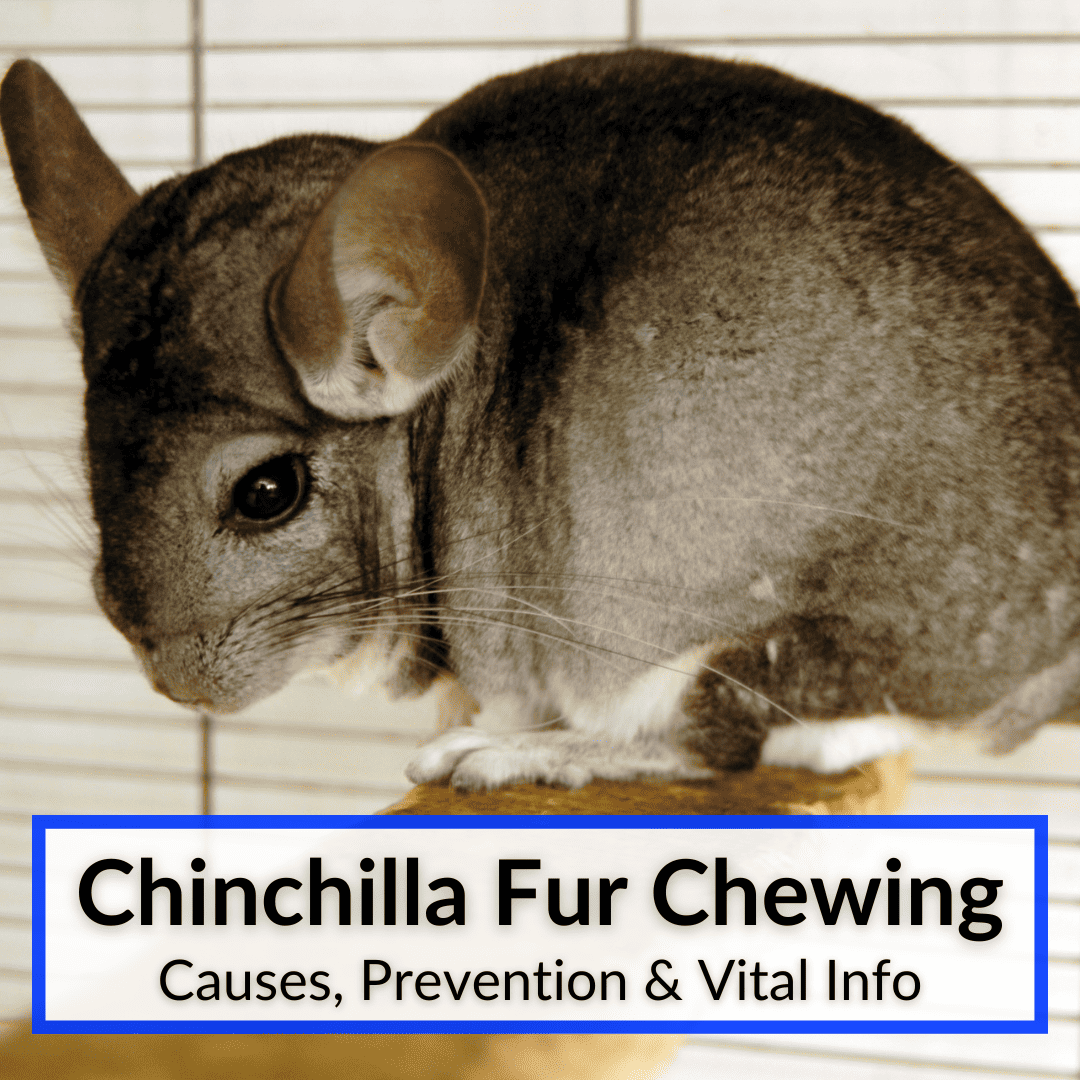
What we are actually talking about is a chinchilla biting its fur and pulling out a large chunk of it.
If you see your pet do this, you instantly know it is not a good thing.
But it is still a natural behavior in chinchillas.
It is no reason to panic. It is simply something they do under certain circumstances.
Take it as a sign that something is wrong and that your pet needs your help.
What is wrong and how can you help?
Keep reading. That is exactly what we will cover below. We will explain why chinchillas might bite their fur and what you can do to put a stop to the behavior.
Contents
Chinchilla Fur Chewing
Chinchillas indulge in fur chewing when they are stressed or anxious. They may also chew their fur due to dental issues, boredom, or underlying health problems.
Malnutrition and skin infections are some other causes of barbering. Genetic issues and environmental problems can also trigger a chinchilla to chew its fur. Let’s take a closer look at the reasons a chinchilla may chew its own fur.
Why Does My Chinchilla Bite Its Fur?
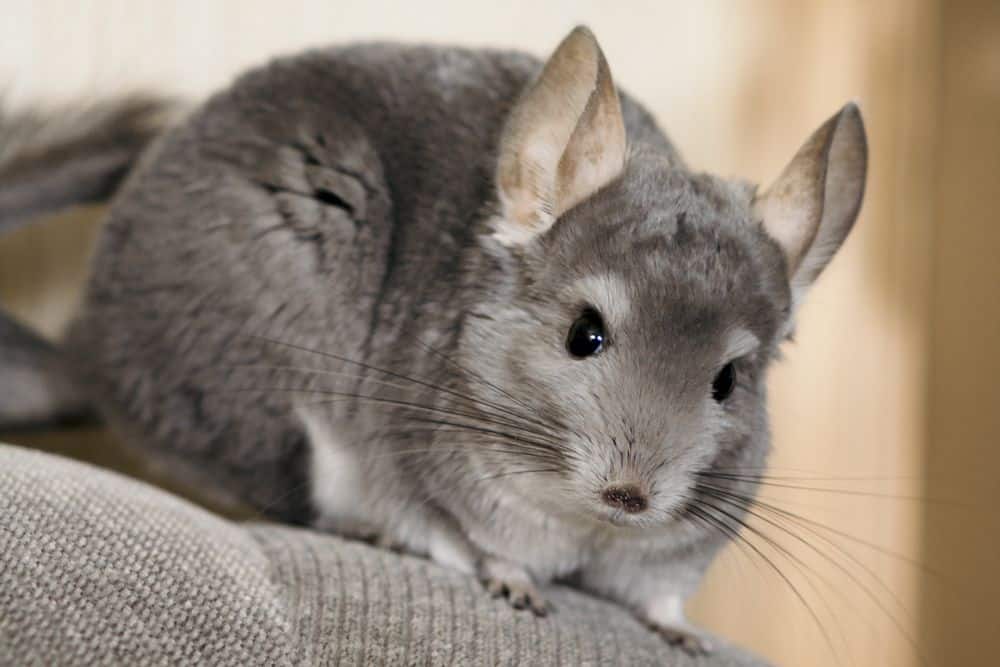
Chinchilla fur-chewing (also known as barbering) is different from regular grooming or scratching an itch. When a chinchilla chews its fur, it takes hold of a large chunk of it with its teeth and chews or chomps on it.
This action can cause part of its fur to be shorter than the remaining parts. Typically, a chinchilla might chew its fur on one or both of its hips. Here are the possible causes behind this behavior in chinchillas.
Stress Or Anxiety
Stress or anxiety is the most common cause of fur biting in chinchillas. A chinchilla can get stressed for a variety of reasons, including a dirty or overcrowded cage, inadequate exercise, or lack of mental stimulation.
Dental Issues
Rodents like chinchillas have ever-growing teeth. They constantly need to chew on something to wear down their teeth. Without the chewing action, a chinchilla’s teeth may grow and dig into its gums, leading to chinchilla tooth abscess. In the absence of enough hay or toys to chew on, your chin might turn to fur chewing.
Boredom
A bored chinchilla may also fur-bite on its hips. You typically see this in chinchillas that are housed alone in a cage and that do not get sufficient playtime and interaction.
Genetic Predisposition
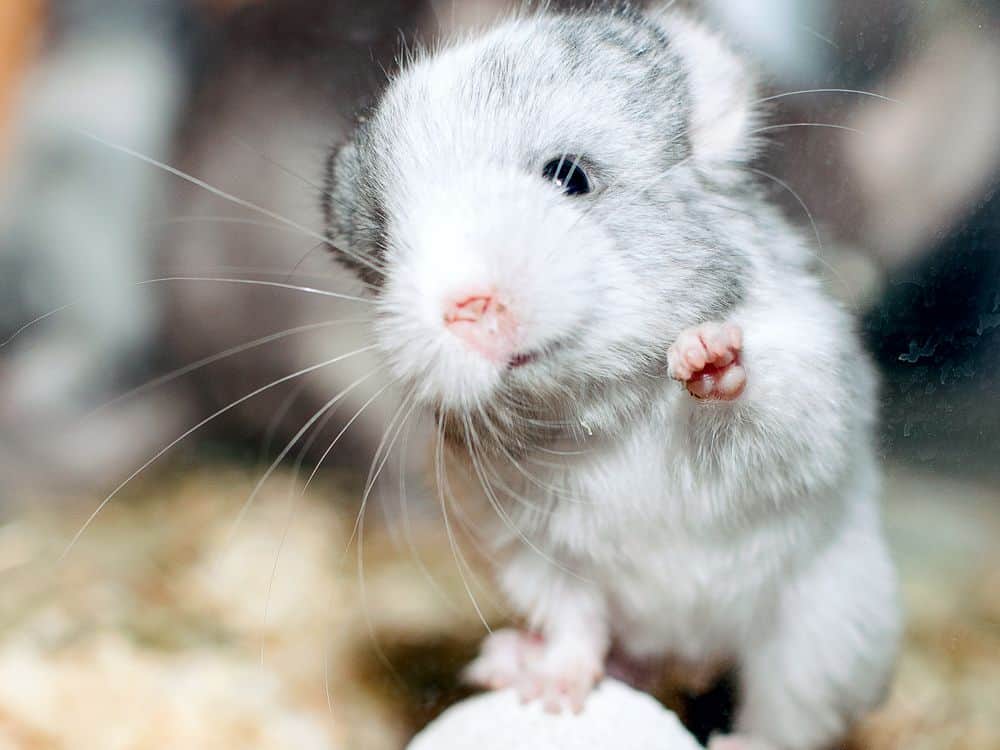
Some chinchillas may be more inclined to chew their fur due to hereditary reasons. Good breeders will refrain from breeding chinchillas that show a tendency to fur-chew.
Poor Environmental Conditions
Your chinchilla’s environment plays an important role in its overall well-being. It might gnaw on its fur due to stressful environmental conditions, such as being stowed in a small cage without enough nesting spaces or unsanitary conditions, or if the cage is located in a noisy area, in direct sunlight, or next to a heating vent or drafty window.
Malnutrition
If your chinchilla’s diet is lacking in high-quality hay and commercial food pellets, then it may develop health issues and nutritional deficiencies. This may trigger its barbering behavior.
Skin Problems
Inadequate dust baths for your chinchilla can cause skin issues, like mites, and parasites that could result in itchy, irritated skin. This may also trigger fur-chewing to alleviate the discomfort.
How To Stop Chinchilla Fur Chewing
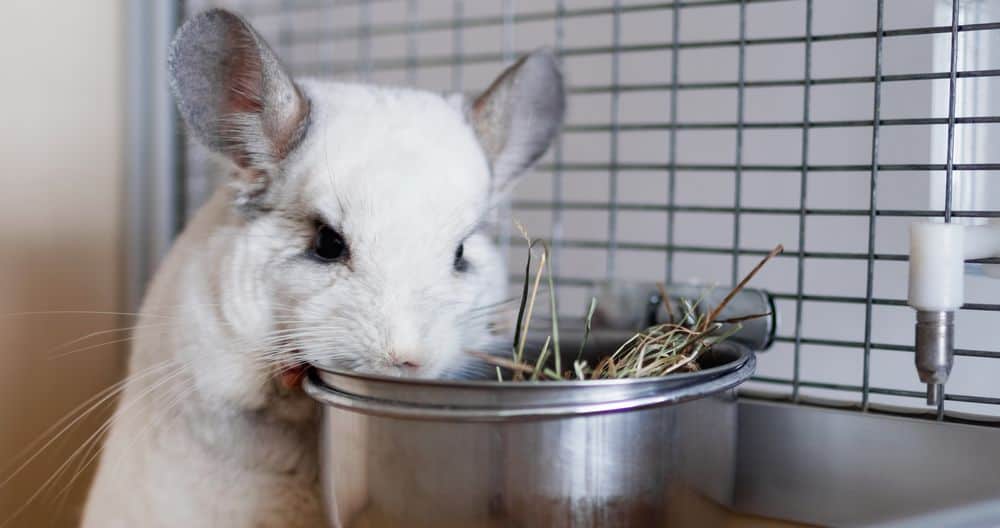
Here are some steps you can take to address fur-chewing in your chinchilla.
Evaluate Its Environment
Make sure you provide your chinchilla with a spacious cage (especially vertically). This will allow your pet to climb, run, and get some exercise. An ideal cage size for a pair of chinchillas is 3 feet long by 2 feet wide by 2 feet tall, or 90 x 60 x 120 cm.
Add plenty of toys inside the cage. If possible, attach a sturdy running wheel for your pet to expend its energy by running. Provide adequate tunnels and hideouts inside the cage.
Provide Mental And Physical Stimulation
Allow your chinchilla some cage-free time daily. Ideally, you should let it out for an hour or two each day in a secure playpen or safe enclosure.
Make sure to interact with it regularly. You can speak to it soothingly, feed it some healthy treats (sparingly!), and even teach it a few tricks.
Provide A Balanced Diet
Chinchillas need a nutritious diet to stay healthy. Feed them high-quality grass or hay and premium pellets. That is all they need, but you can also give the occasional treat, like certain vegetables or fruits (in moderation only).
A healthy diet can prevent nutritional deficiencies that may trigger fur chewing. Moreover, a steady supply of hay can wear down your pet’s sharp teeth to prevent dental issues, which can also cause a chinchilla biting fur.
Check Your Chinchilla’s Fur
If your chinchilla lets you handle it, check its fur for skin rashes, redness, flakiness, scabs, parasites like chinchilla mites or lice, etc. If you spot these issues, please take your chinchilla to the vet. Provide your chinchilla with regular dust baths to help keep its fur healthy.
Reduce Stress
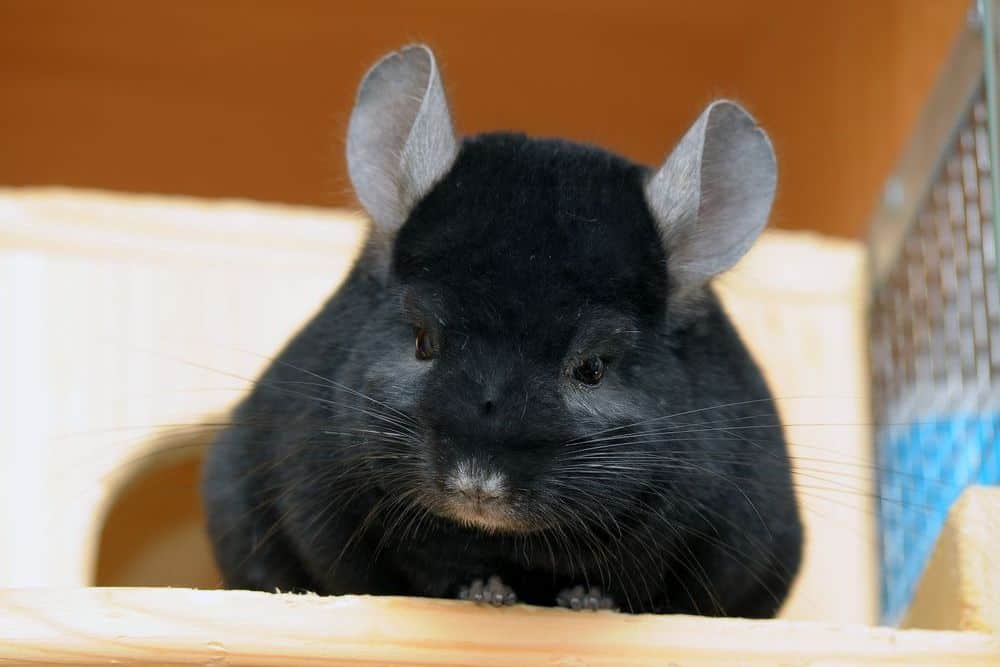
Avoid over-handling your chinchilla. Make sure its cage is located in a quiet area so it can sleep well. Avoid sudden noises, bright lights, and other stressors.
Rule Out Health Issues
If your chinchilla’s fur chewing persists despite following the above steps, please have your vet examine it. They can provide appropriate treatment and guidance to eliminate fur chewing.
Fur Chewing In Chinchillas: Additional Tips
Two big reasons for a chinchilla pulling out fur are stress and boredom or other form of unhappiness. We will give you some tips for calming a stressed chinchilla below. First, let’s tackle unhappiness.
How To Recognize If Your Chinchilla Is Unhappy
It is important to evaluate your chinchilla’s mental well-being from time to time. Its behavior and body language can give you an insight into whether your pet is happy or not. In addition to excess fur chewing or barbering, here are some other signs of unhappiness in chinchillas.
Lack of Appetite
While a healthy chinchilla will happily munch on the treats and hay you provide, an unhappy one might not show much interest in food. Over time, your pet may even lose weight. Monitor your pet’s food and water intake and if it seems reduced, please see your vet.
Reduced Activity
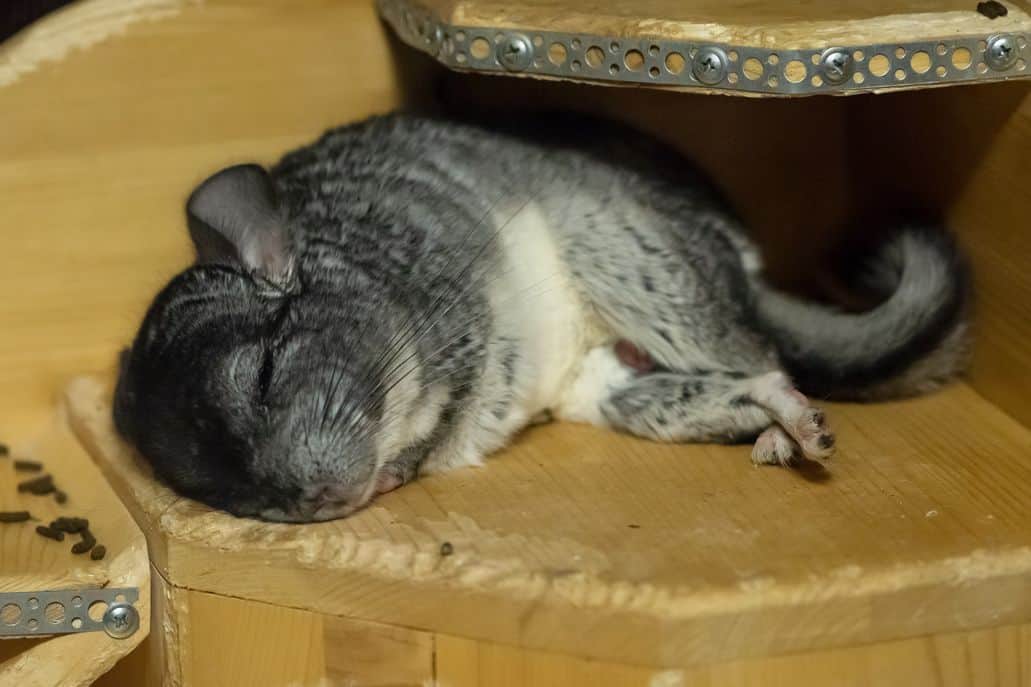
Healthy and happy chinchillas tend to run, play, and might even “popcorn“. On the other hand, an unhappy chinchilla may have reduced activity and might hide and refuse to play or come out of its nesting area.
Unkempt Look
This is another sign of depression in chinchillas. Chins are fastidious self-groomers. They love taking dust baths and cleaning their fur from time to time. An unhappy chinchilla might completely avoid self-grooming and display a matted, dirty coat as a result.
Indulging In Repetitive Behaviors
An unhappy, stressed chinchilla might lick, chew, pace around the cage restlessly, or display other repetitive behaviors. These are signs that something is amiss with your pet.
Aggression Or Trembling And Shaking
Aggression is another sign of unhappiness in chinchillas. Your pet might lunge, bite, chew, or attack its cagemates, or it might even turn on its humans. If your normally docile chinchilla turns aggressive, it could be a sign of stress, illness, or discomfort in your pet.
Conversely, some chinchillas may turn timid or fearful and might tremble or shake if they are unhappy or stressed due to something in the environment.
How To Calm A Stressed Chinchilla
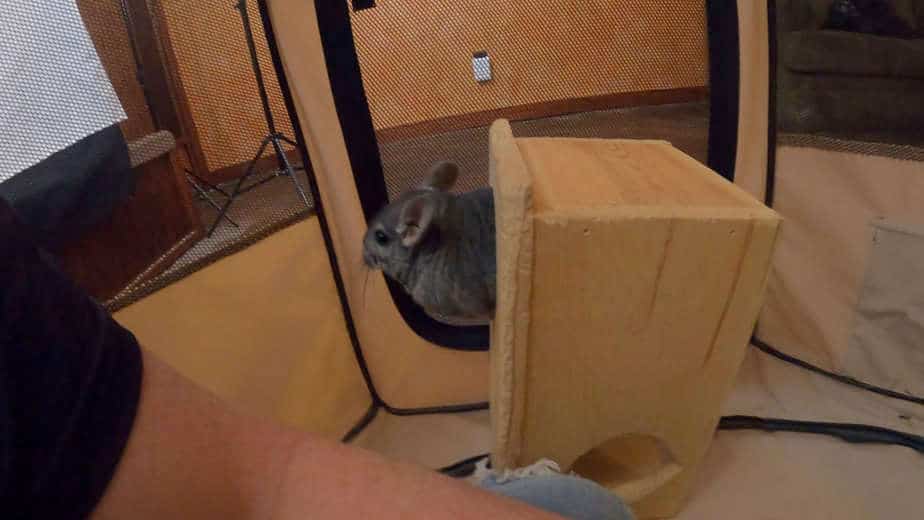
Here are some steps you can take to calm your stressed chinchilla:
- Maintain a stress-free environment.
- Relocate your chin’s cage to a noise-free part of your home away from direct sunlight.
- Add some enriching and stimulating toys inside the cage along with plenty of hideouts for your chinchilla to rest.
- Avoid overhandling your pet. It it does not want to be handled, let it be. Be patient. It will come around.
- Use a soothing voice to speak to your chinchilla.
- Establish a consistent, daily routine and minimize sudden routine changes. Take your chin out at the same time every day for some out-of-cage playtime. Feed your chinchilla and clean its cage at the same time every day.
- Offer treats, praise, and rewards when your chinchilla is calm. This positive reinforcement will help reinforce its calm behavior.
Chinchilla Biting Fur: Final Thoughts
Chinchilla fur chewing will cause you a lot of worry the first time you see your pet engage in this behavior. I know it did for me. And it is a behavior that indicates that something is wrong.
If you see your chinchilla biting its fur and pulling it out, try to stay calm. Go through the possible causes above and see if you can figure out why your pet is chewing its fur. Then fix the issue that is causing the behavior. If the fur chewing persists and you can’t figure out why, take your pet to see a vet.
Leave a Reply